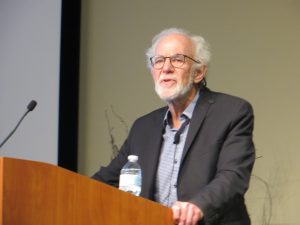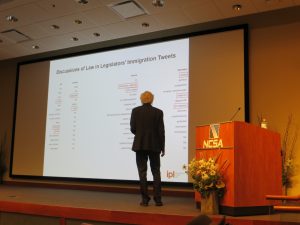On Thursday October 17th, the Center for Global Studies hosted Dr. David D. Laitin, a co-founder of the Immigration Policy Lab, and James T. Watkins and Elise V. Watkins Professor of Political Science at Stanford University. CGS invited Dr. Laitin to the University of Illinois Urbana-Champaign to give a presentation on his latest research project as part of the MillerComm Series in conjunction with the Center for Global Studies’ year-long series on Global Migrations. Dr. Laitin’s presentation was titled “Framing the Global Immigrant Challenge: Evidence from Elected Representatives’ Tweets.” 
Dr. Laitin began by outlining several ideas. First, he suggested that the global migration crisis sees a steady flow of migrants coming from the Global South to the Global North, a phenomenon that continuously changes the culture and industry found in the North. Second, he highlighted the need to talk about migration and immigration, and the serious humanitarian challenge that the growing number of refugees and displaced peoples presents. He then posed several questions he believes to be pertinent to his overall project and the global migration crisis. They were:
- “Does the salience of the immigration issue divide left and right traditional parties?
- Do sentiments towards immigrants and refugees divide the left and right traditional parties?
- Do elected officials develop coherent doctrine consistent with their party’s comparative advantage or are tweets merely event driven?
- Are the tweets from the traditional parties responsive to the tweets of the nativist parties?
- Do left and right parties own different dimensions or topics in the immigration realm?”
Dr. Laitin’s project involved a long process of data collection. First, he and his team identified elected officials from the countries of France, Germany, Canada, and the U.S. who were in office between 2013 and 2019. They then collected all the tweets from each elected official in each country from that time frame. They collected over 8 million tweets using Twitter’s streaming API. During the categorization process, the system was able to organize the tweets into four sections: those relating to immigration and its connections to economy, security, law, and culture. The results of these groupings suggested that these countries, the United States and Germany included[TDC1] , care most about what effect immigration has on security and law. Of the four categories, the influences of immigration on economics and culture were thought to be less significant; however, they are still significant enough to  mention.
mention.
At the end of his presentation, Dr. Laitin made several overarching conclusions. First and foremost, he made the argument that elected officials are utilizing Twitter to react to daily events, rather than using Twitter as a tool to discuss long-term immigration trends. Second, he made the conclusion that neither left nor right traditional parties favor positive or negative tweets. On average, elected officials tweeted both positive and negative sentiments towards immigration, regardless of their party affiliation. However, the salience of far right parties was greater in response to immigration overall. Elected officials associated with far right politics tweeted more about issues relating to immigration than officials associated with more left parties.
Dr. Laitin’s observations on these topics included:
- Political parties affiliated with the right are more inclined to tweet about issues of immigration and security, but less about immigration and culture;
- Both sides of the political spectrum downplay the significance of immigration within discussions of economics and culture; and
- Canada provides a unique outlier, as they give no favor to any one dimension or topic.
The API used by Dr. Laitin and his team is stil l running in real-time, continuously collecting tweets from elected officials. Dr. Laitin and his team are planning to include more countries and languages in the future, and hopefully create a website or database so the tweets and their trends are more readily available to researchers and the public.
_______________________________________________________
To learn more about Dr. Laitin, you can visit his faculty page from Stanford University.
To research more about global migration issues and politics, visit the libguide titled “Framing the Global Immigrant Challenge: Evidence from Elected Representatives’ Tweets”.

Comments are closed.